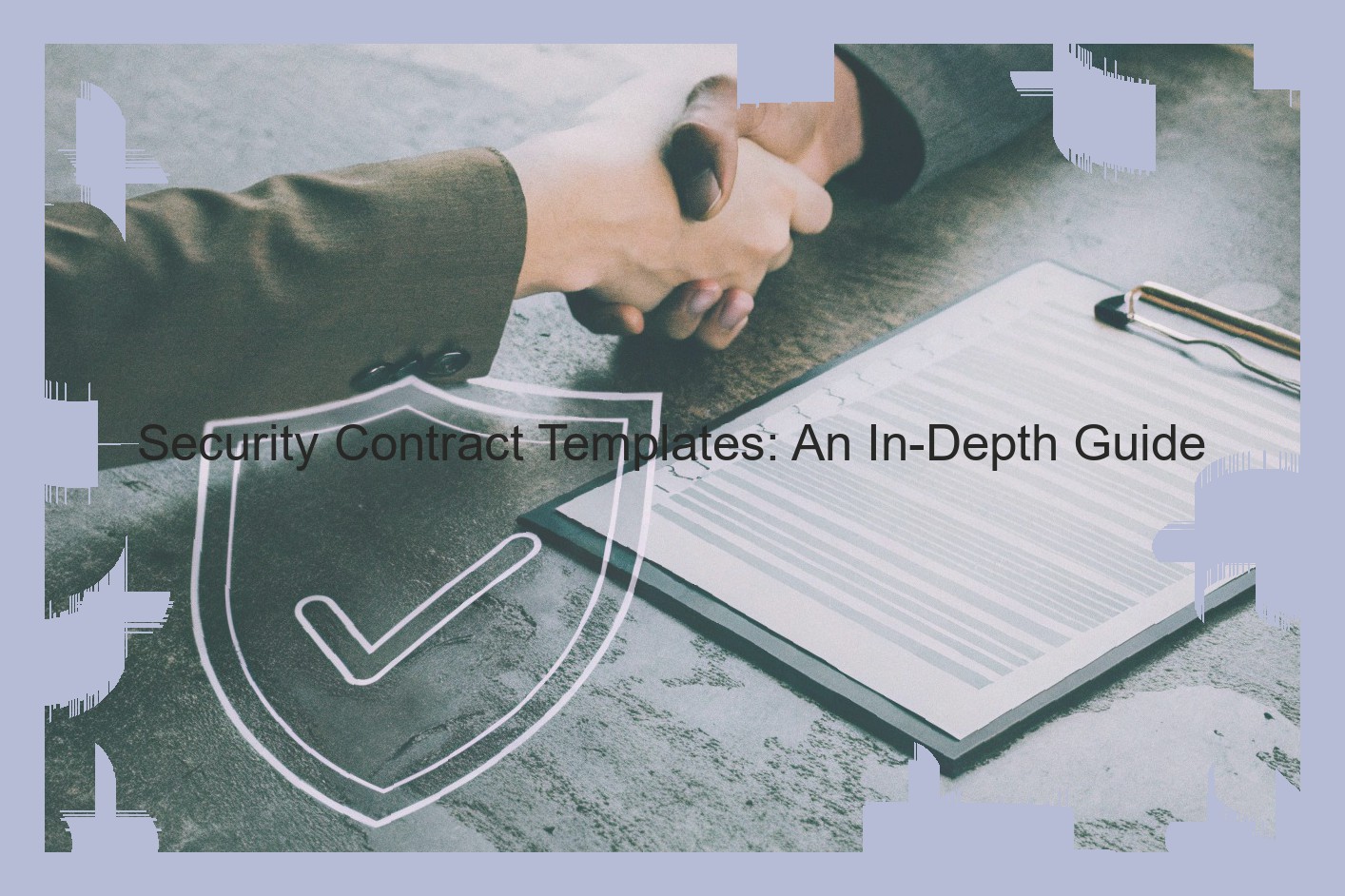The Basics of a Security Contract
A security contract is an agreement between a business/entity that needs security services and the company/individual that provides such security services. The purpose of the security contract is to provide the necessary details that are essential for a beneficial relationship between the security provider and the business, usually in the form of a form document that lays out all of the contractual obligations of both parties . It is crucial that this document be comprehensive and adaptable so that all parties have the clearest sense of things which must be done and which must not be done. Especially with security matters, failing to have the clearest guidelines can result in significant liability for either side.

Essentials to Include in a Security Contract Template
A strategic security contract template must include the following components:
Parties. The first step in creating a security contract template is identifying the parties. Essentially, this means identifying what type of security service you will be hiring and who will be paying for them. It can be private home security, corporate/retail security or security guards. These different types of security are compensated differently so this is a critical step in preparing a security contract template.
Scope of Work. This section of your security contract template must detail what the job will entail. Is this a 24 hour a day job, 5 days a week? Six days per week? Seven days per week? Is the work security guards, private security, corporate security, retail security or, perhaps, commercial security? Is there an on-site presence or is the employee expected to be patrolling a large community? The scope of work is what defines the work performed and how the security contractor is compensated.
Payment Terms. How is this service to be compensated? Is it to be a flat fee for the month or year? Is it paid by the hour? Is the compensation periodic or one time? Is there compensation for travel time? For training? Are there other forms of compensation to be considered?
Confidentiality Agreement. Depending on the specific type of security service being contracted, there may be a need for a confidentiality agreement. Perhaps the security team will be privy to private company information. Maybe they will be monitoring private transactions or private activities. It may be necessary to ensure that personal information is kept confidential and that no catastrophic leaks occur as a result of employing security agents.
Duration. The next step in preparing a security contract template requires that the duration of the employment be clearly stated. Are we talking a day, a week, a month, a year? Is this security team a temporary backup to regular security or are they to be employed for the foreseeable future? Taking the time to be clear about how long the new security team will be in place prevents confusion later.
Termination. The final portion of a security contract template stipulates how services under the contract are to be terminated. Do the parties require prior notice, advance notice or is either party permitted to terminate services with or without notice? Will a termination fee be charged? Will a quality assurance who will assess the performance and determine whether the contract should be terminated? Is a deed of covenant to be signed?
Advantages of a Security Contract Template
A well-structured security contract template offers several advantages for both parties involved. First and foremost, it saves considerable time. Both businesses and security professionals benefit from having a ready-to-use, legally compliant template for drawing up contracts quickly. Whether there’s an immediate need for security services or a tighter deadline to finalize agreements, a template provides an efficient solution.
Being legally compliant is a requirement for any contract, and for security contracts, this is even more critical, given the highly regulated nature of most security-related work. By using a security contract template that adheres to relevant laws and regulations, hiring companies can be more confident that they will be in compliance with legal standards and requirements.
A security contract also lays out the basic working relationship between the parties involved. It will describe the work to be performed by the security company, the payment arrangements, and other necessary conditions of the hiring. A security contract template helps ensure that there is no ambiguity or confusion regarding the responsibilities of both parties. With a clear contract signed by both parties, when one side is damaged or put out because of the actions or inactions of the other side, there is a clear basis for seeking legal redress through the courts.
How to Personalize Your Security Contract Template
When it comes to guarding the details and the assets of your business, you’ll want to make sure your security contract template is meeting your specific needs. It will take a little extra time on your part up front to ensure that you have the right protections in place, but it will pay dividends in the long run. Here are some tips to help you customize your security contract template and make sure it’s fulfilling the unique needs of your business:
Review all of your current policies and procedures and make absolutely sure that your security contract template complies with them. This includes standards and requirements regarding data privacy, such as how reviews are conducted and whether or not an internal audit must be performed to determine if the contractor’s control systems properly protect data privacy. If no such requirements currently exist, it’s worth reviewing the language of your security contract template to determine if they are beneficial to your overall data privacy compliance approach.
It wouldn’t be a good security contract template without appropriate language addressing liability and breach. When measuring liability, determine if your specific business has any recommended liability requirements. Similarly, for breach, what type of data is important to your company and how would you want these terms to flow? Does a specific method of breach notification matter?
Security contract templates often introduce new language that can conflict or contradict existing provisions already in place. Before sending your security contract template off to a contractor, make sure you’re not creating additional risks for your business by adopting conflicting language. Even a small ambiguity can have major consequences for your business. To that end, if you have specific standards, policies or processes in place, it’s important to review your security contract template and make sure that the approval processes address them.
Make sure your security contract template language complies with any laws and regulations applicable to your industry. For example, if you’re part of the financial industry, your security contract template should comply with the Gramm-Leach-Bliley Act (GLBA), which regulates how financial institutions share information. Alternatively, if you’re running an online business, your security contract template should be familiar with the requirements of the California Online Privacy Protection Act (CalOPPA).
Don’t forget to outline the requirements for ongoing training and periodic review of the contract terms outlined in your security contract template. As your business grows, your security contractors will need to be evaluated and security contract templates revised, modified or at times, even rewritten entirely. Making ongoing training and reviews of your security contractors a requirement can help you stay ahead of the curve.
Typical Mistakes to Steer Clear Of
Many contract drafters fall into the trap of thinking that "good enough is good enough," and that simply including form boilerplate will ensure that their security contract will withstand any legal challenge. Nothing could be further from the truth. The most common mistakes made when drafting security contracts are as follows:
1. Security agreements or guarantees are not carefully customized for the particular credit transaction. Like a pair of shoes, contracts come in many different sizes and varieties. They are also typically made by tree-hugging types who give nature tours of Redmond, Oregon to environmentalists. That means they cost more than buying a set of off-the-shelf shoes at your local department store. But like a pair of shoes custom-made by a local cobbler, a well drafted document is designed to fit the specific transaction and allow the parties to work together while establishing the relationship. "Off the rack" contracts tend to be one-size-fits-all, and do not take into account the governance provision for most entities (such as shareholders, managers and other officers of corporations), which means the provisions ultimately fail because they don’t address liability . For example, if the terms of the security contract specify a threshold amount that constitutes an event of default, as opposed to a single dollar amount, the lender may wish to be vigilant regarding incidents that, while not an outright default, tend to portend a developer’s eventual demise.
2. The lender boasts that its forms are "bulletproof" and contains a false sense of security. Even seemingly "ironclad" documents can be broken, particularly when they contain provisions that conflict with applicable law or the governing documents of the borrower. For example, some security agreements specifically disclaim all potential claims that are not raised within 90 days of the borrower’s default. Courts are skeptical of such provisions because they encourage lenders to rush to judgment and fail to ensure that no conflicts of interest exist due to failure to disclose certain defects. In addition to creating potential exposure for the lawyer that puts it together, doing due diligence up front is better for business and helps the lender develop stronger relationships. By doing the homework on conflicts, transactions, etc., the parties can avoid getting into a nasty public relations battle down the line.
Relevant Legal Factors
There are various laws and regulations related to the provision of security services with which both security providers and their customers must comply, including federal, state and local laws. Security providers will be subject to several laws in the jurisdictions where they will be doing business (including where employees will be performing services) and customers will be subject to laws in any jurisdiction where their business is located.
Certain states, such as Illinois, require licensure of private security contractors including those providing guard services. A license typically includes a mandatory background check of those who will be providing security services both to ensure the prospective security personnel has a clean criminal history and to ensure the security provider is legitimate. Other states, such as Massachusetts, require licensure of security providers and those providing security services.
Regardless of whether licensure is required or not, all security providers should have liability coverage to protect against a variety of liabilities. Insurance policies typically provide a defense for covered claims even if the allegations are false, thus protecting the security provider from the costs of defending against spurious claims in court.
Further, customers need to understand that merely entering into a contract with a security provider will not absolve the customer of liability for actions by the security providers or security services. The law treats each party to a contract as an independent actor. Thus, if a customer is found liable for an act committed by a security provider, the customer will not necessarily have a claim against the security provider simply because there was a contract.
Accordingly, each contract requires careful consideration and should be reviewed by a lawyer with experience in security agreements. Contracts should also be customized rather than using a generic "standard" form.
Security Contract Template Resources
To make the process of selecting the right security contract template easier, consider using templates from respected industry associations or professional websites that offer tools, such as an online contract creator or editable template, and comprehensive information about security services.
Associations, such as ASIS International and the International Foundation for Protection Officers, offer free and paid downloadable templates and forms to their members. These may include customer inquiries, evaluation, and security guard service contract templates .
Security blogs and websites, in addition to offering general contract templates, may offer templates for specific elements of contracts for security services. In particular, many offer employee handbooks, confidentiality agreements, and non-compete clauses as downloadable Word documents or PDF, which can be adapted for inclusion in your security contract.
For those who prefer to customize their contracts, an online contract creation tool or template creator may be considered. These tools offer editable wording and formatting to help minimize the time it takes to create a professional contract.



